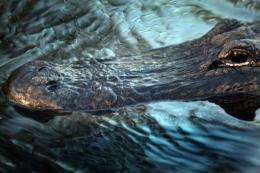US scientists recruit crocodiles to save wetlands

US scientists in the Florida Everglades are recruiting crocodiles and alligators in their fight to preserve the fragile wetlands by implanting satellite chips in their necks for the first time.
As the animals make their way through different parts of the sprawling national park they beam back information on changes in the ecosystem and its impact on their size and movement patterns.
"They are giving us important data... They are working for us," says Frank Mazzotti, an ecologist and expert in the large reptiles at the University of Florida.
The information is transferred by satellite to a computer application that uses Google maps to track the movements of the animals, who are captured and released in groups of around 15 at a time.
"Scientists use different parameters to track responses of alligators and crocodiles to changes in the ecosystem, including their number, their weight, their size and their places of habitat," Mazzotti said.
"All this information provides important data that is instrumental in analyzing the health of the Everglades’ ecosystem" and in seeing whether past conservation efforts have succeeded.
Conservationists estimate there are between 500 and 1,200 crocodiles -- distinguished from alligators by their narrower snouts and exposed teeth -- in southern Florida.
The animals, which can grow to be 15 feet (4.5 meters) long and weigh up to 450 pounds (200 kilograms), have declined in number over recent years because of loss of habitat, illegal poaching and water pollution.
Like the many bird species that inhabit the Everglades, the fate of alligators and crocodiles is closely tied to water levels, which largely determine their food supply, Mazzotti said.

Falling water levels results in fewer plants, needed for nesting and shelter, as well as fewer fish to support the larger animals such as birds and reptiles.
An estimated 30,000 to 50,000 birds nest in the Everglades every year, a drastic reduction from the 1940s, when as many as 500,000 lived there, said Jerry Lorenz, of the Audobon of Florida, a conservation group.
"In more than half a century, it's been about a 90 percent decline on average," he said.
A succession of floods, hurricanes, fires and drought has produced a unique ecosystem in the Everglades with a wealth of rare plants and animals, including the crocodiles, manatees, flying squirrels and gray foxes that climb trees.
Conservationists fear that budget cuts could complicate efforts to conserve the wetlands, with a million visitors every year attracted to the Everglades National Park, a subtropical wilderness.
The popular French clothing brand Lacoste, which funds a global program to protect crocodiles called "Saving the Logo" after its own trademark, is contributing to the efforts to conserve crocodiles and alligators in the Everglades.
The company, founded by French tennis champion Rene Lacoste, is putting up some $150,000 over the next three years to help save crocodiles around the world.
"We are very pleased to participate in this new project that clearly emphasizes the importance and the key role of crocodiles and alligators in the ecosystem," said chief executive Christophe Chenut.
(c) 2011 AFP

















